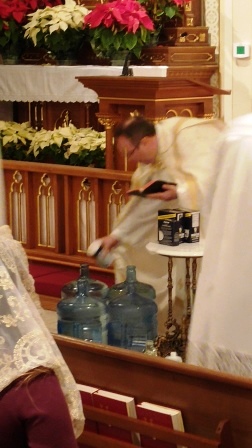QUAERITUR:
Well, basically that: if a priest were to bless something without
following the ritual, assuming he has the intention to bless it, says “I/God bless you”, it’s done in the Holy Name of the Trinity, etc: Is it as any other blessed object?
I don’t know for sure.
There are some factors to weigh.
First, what “ritual” are we talking about? The older, traditional Rituale Romanum or the new, ridiculous Book of Blessings (which ironically doesn’t have blessings in it, but rather texts full of happy thoughts)?
Let’s assume you mean the Rituale Romanum. No, wait, we need more distinctions. Is it the Rituale itself, or is it a book of commonly used rites and blessings excerpted from the Rituale? The Collectio Rituum or Parish Ritual for example? US HERE I posted about it HERE (and there is a newer edition). This is a replacement for the old Collectio. Is it a volume of what is commonly called “Weller” after the translator? It has Latin and English side by side. US HERE – UK HERE
Down to business. The Rituale Romanum in effect at the time of the Council (which is is the edition authorized for use by Summorum Pontificum and Universae Ecclesiae 35) says explicitly that blessings are to be done in Latin or they are invalid.
The Rituale Romanum, Title 8, Chapter 1 gives the general rules for blessings. These are also presented in Weller, vol. 3, pp. 2-5.
Note that n. 2 states:
“Benedictiones sive constitutivae sive invocativae invalidae sunt, si adhibita non fuerit formula ab Ecclesia praescripta.
Both constitutive and invocative blessings are invalid if the form prescribed by the Church is not used.”
Weller’s English translations were never approved for use, even in that interim time after the Council when more English could be used. The translations are for reference, not use. The LATIN is approved for use.
Here’s the bad news for all those priests out there who think that they can, for example, bless Holy Water using the ENGLISH in the Weller volume:
Fathers, you are not blessing Holy Water.
If you used the Weller English to exorcize and bless salt, exorcize and bless water for Holy Water, you’ve just got plain ol’ salty water. Have you been using Weller English to bless people’s statues, medals, houses? Let’s not even get into using the English in a post-Conciliar edition of the Collectio or in Weller for exorcisms in baptisms.
Circling back to the top, I want to say clearly that if a priest “were to bless something without following the ritual” I really don’t know what happens.
Here are the factors I put into the scales of my mind.
- God loves us and wants us to have blessed things.
- The Church without doubt said that the approved text, meaning Latin, has to be used.
- God knows that 99% of priests don’t know Latin because the Church has, manifestly contrary to the law, cheated them out of that critical aspect of their formation and identity.
- God is not limited by the Church’s positive law concerning blessings.
- Priests of the Roman Catholic Church ought to pray like Roman Catholic priests.
- The Rituale Romanum itself states that it is a starting point, a reference point for the development of local rituals.
- It is extremely important to maintain the categories of constitutive and invocative blessings against modernist encroachment and the campaign against them.
- We are our rites!
- The wider world is affected by what we do regarding sacred objects, places and persons. Getting it right is more important than our comfort zone.
Putting all of that into the mental hopper and letting it macerate, when a priest blesses (constitutive) using some other form than what is in the book, I am not sure what happens. I am inclined to think that, God being merciful, something happens. If, for example, someone were to walk up to me and ask me to bless the Rosary she was holding out, and if I were to make the sign of the Cross over it while saying something like, Benedictus benedicat (which I got from my old mentor the holy and late, great Card. Mayer), I am inclined to think that the Rosary was blessed.
However, I cannot argue that I don’t know Latin. I cannot argue that I don’t have the proper formula in Latin for the blessing of a Rosary because a) I know it and b) it’s in my Breviary app on my phone. Instead of just saying “Benedictus benedicat“, I could take about 5 seconds to open the app and find the proper text for a blessing or, in a pinch, even use the text ad omnia… for all things.
God has to make up for my many deficiencies all the time, but I don’t ask Him to make up for my being deficient when it comes to blessings and sacramental forms! No one walks away from my confessional and wonders if the form of absolution in Latin was valid or walks away with freshly blessed statues or rosaries and doubts for a second that they were blessed.
Let’s not, Fathers, make milk-toast, feckless, half-assed efforts when doing something as important as blessing things, which often includes exorcizing them first (Holy Water, St. Benedict medals, etc.).
Let’s be Roman Catholic priests and use our Latin. We are our rites. This has to do with our identity and the knock on effect it has on the wider Church.
Let’s not whine that the Latin is toooo haaard. If it really is tooo haaard for you, should you really be a priest of the Roman Church? That’s a little harsh, I know, hyperbolic. But, c’mon men! You get my point! Little boys learn some Latin to serve Mass! Latin is a language, and I don’t mean language like the aptly named computer programming language Malbolge. Latin is meant to be learned and used.
If Latin seems to be tooo haaard what you really need to do is rearrange your priorities until you get some Latin calluses on your hands. You’ll find that Latin isn’t that hard once you try.
If for nothing else, if not even for your priestly identity, then learn the Latin so that you can bless things and exorcize and even absolve and anoint and baptize and leave not the slightest trace of a doubt in anyone’s mind that what you did was valid and that it resulted in the desired effect. If you don’t use the Latin for yourself, do it for the good of and the peace of mind of others.

































Well, now I’m totally confused. Almost every blessed item I have was blessed in English, even down to the Nativity statue blessed during Mass during Advent. Are none of them really blessed then? ? I have a crucifix and olive wood Madonna that the priest just made the sign of the cross over in English, and as best as I recollect I think that’s all. Am I understanding correctly that they are the not actually blessed? This is a disaster. ?
[Of course it is not disaster. Disaster is an earthquake which produces a tsunami that rushes toward a coastal city. Disaster is the Roman army descending on Jerusalem in 70AD. Disaster is one party rule by Democrats. Disaster is the awarding of red hats to certain men under 80. I don’t know what the deal is with the blessings your things received. I think I sketched out the issues adequately, above. As far as doing things with the older Rituale is concerned, priests are supposed to Latin. Is this a matter in which a sort of “Ecclesia supplet” can take place… a “Dominus supplet”? I sincerely hope so!]
Once again I see how God has poured His blessings upon my unworthy soul. My beloved priest since Summorum Pontificum first produced our TLM parish has spoken these same words many times. I know at least one family who came to get “real” holy water and to get their sacramentals properly blessed and never stopped worshipping with us. Thank God with every breath!
These discussions make me quite sad.
I usually seek out the services of a newly ordained parochial vicar for blessings. They are great. Or I leave stuff at the office so I don’t have to witness the ritual.
[The intention is not to make you sad. The intention is to inform and to motivate more and more priests to get serious about constitutive blessings.]
i am put in mind of the saying by the late Fr. Foster (for whose soul i pray daily) along the lines of this: whores and bums in Rome spoke Latin, so who are you to say it’s too difficult?
Hopefully many priests read this blog and follow through with proper blessings.
Even the Latin forms in the Weller volumes can be problematic. Pope Pius XII approved a revision of the Rituale Romanum in 1957 (Weller is based on the 1925 edition). The 1957 version better accords with the provisions of Summorum Pontificum as it was in effect in 1962. A new reprinting of the 1957 version is available from nova et vetera from Germany. I have noticed a few changes/additions to the 1925 version in Weller, though how much total change was effected, I am not certain.
I don’t think most people on here have anything to worry about, and have a few points I can add that should be helpful:
-The current “Novus Ordo” Book of Blessings, when it comes to the items most commonly presented for blessing (medals, rosaries, scapulars, crucifixes, sacred images not intended for display in a church) *does indeed* provide, in the short form recommended in that book for such items, a formula in language that clearly intends to confer a constitutive blessing: “May this _____ and the one who uses it be blessed, in the name of the Father….” indicating that a sign of the cross should be made as well. The short formula recommended for rosaries is the exact same text except it says “rosary” instead of providing a blank.
-the current Enchiridion of Indulgences, promulgated by St. Paul VI in 1968, states, in the footnote to the section on indulgences for blessed articles of devotion, that when a priest makes the sign of the cross over an object with the intention to bless, this suffices for a “proper” blessing to take place that then enables indulgences to be gained from it. It would then seem to clearly follow that blessings made in such a manner are perfectly valid:
10
Use of Articles of Devotion
(Obiectorum pietatis usus)
The faithful, who devoutly use an article of devotion (Crucifix or Cross, Rosary, Scapular or Medal) properly blessed by any priest, obtain a partial indulgence.
“In order to bless an article of devotion properly the priest uses the prescribed formula, if there is any; otherwise, he makes a simple Sign of the Cross toward the article of devotion, laudably adding the words: “In the name of the Father, and of the Son, and of the Holy Spirit.”
-Lastly, in 1964 the U.S. bishops did indeed obtain permission from Rome for the English translation of the older Rituale (Weller) to be used validly. That would have expired with the promulgation of the current “Novus Ordo” Book of Blessings in 1984, however, since that book states in its introduction that it abrogates the older Rituale, which would have been true until Summorum Pontificum provided for valid and licit universal use of the older Rituale in 2007. However, since Pope Benedict XVI indicated that the rules in place in 1962 should be observed, it would seem that only the Latin from the older Rituale can be used licitly, and perhaps validly, today; at the same time, though, regarding validity, the clarification in the Enchiridion of Indulgences would seem to supply, as noted above, for the validity of any blessing made with requisite authority with intention and at least the sign of the cross, even if it may not align with what one might call the “mind of the Church” on something (i.e. you might have water that is blessed, but perhaps not “Holy Water” strictly speaking, at least as the Church thinks of the concept).
As an aside, I would think, going back to the rules that accompany Summorum Pontificum, however, that deacons cannot validly use the older Rituale (unless specifically allowed in the original rubrics someplace, and offhand I can’t think of any, at least for any sacramentals).
Pingback: MONDAY EDITION – Big Pulpit
The question of blessings by permanent deacons is addressed above by Boniface. Are deacons “stuck” using exclusively the “Novus Ordo” book of blessings? Were (or are) transitional deacons permitted to offer any of the blessings contained in the older Ritual? Thanks.
DFC: “stuck using”… I wouldn’t use it at all, for anything, if I were still just a deacon. The “blessings” don’t bless. The theory presented in that book, in the forward, states the intention to eradicate the constitutive blessing.
When it comes to the Rituale Romanum… no, there’s not much that the deacon can do. That’s okay. There is an ontological difference between diaconi and sacerdotes.
Some say that it is possible for deacons to bless bread and fruit, which was something that traditional lectors (minor order) could do. Would deacons today be able to bless these by the fact that what the lesser could do the greater could do? It’s a little thin.
It seems that deacons can give invocative blessings, which is nice, but they are limited to invocative, rather than constitutive blessings.
I wish I wouldn’t sound like such a bad Catholic asking this question, but what is the difference between blessing a child or food (by a layperson) and the blessing a priest imparts (on a person or an object).